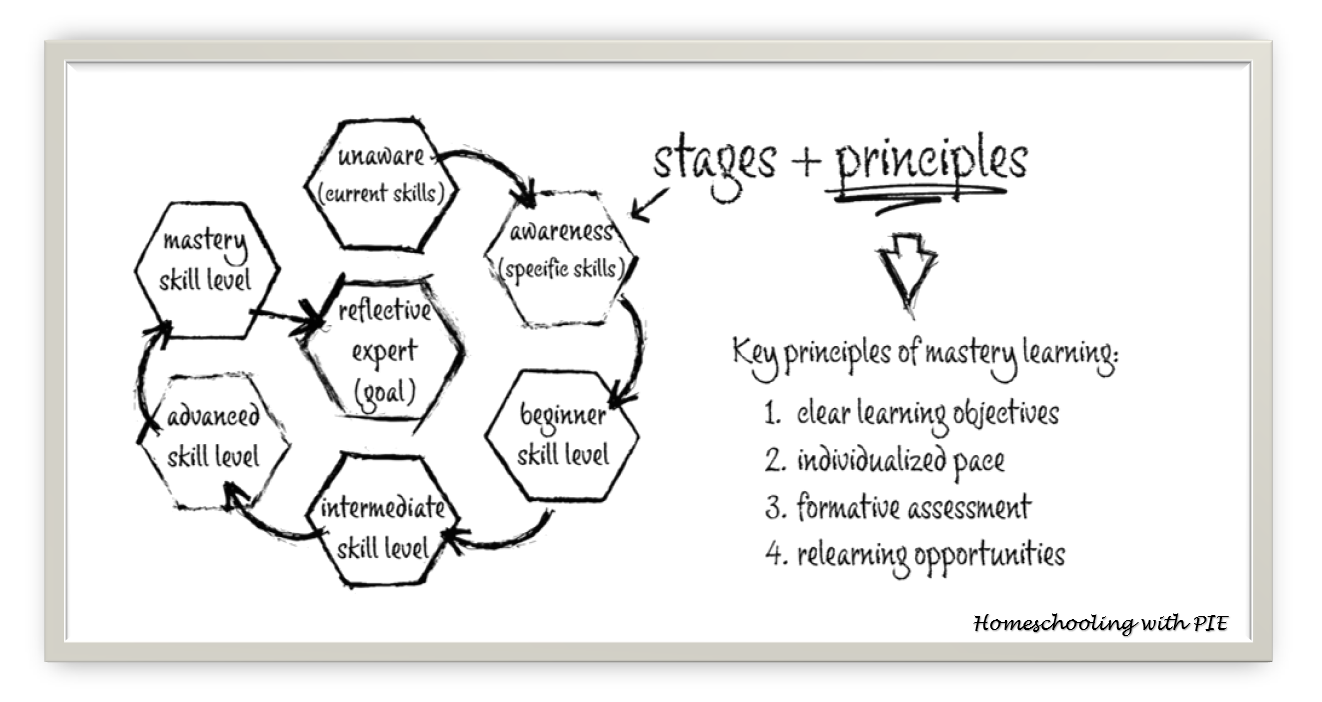MANAGING EXPECTATIONS: MASTERY LEARNING

Managing Expectations: Mastery Learning
Mastering Success: The Power of Mastery Learning in Homeschooling
Homeschooling has emerged as a dynamic and flexible alternative to traditional education, allowing students to learn in environments tailored to their unique needs. One instructional approach gaining traction within the homeschooling community is Mastery Learning. This method shifts the focus from merely covering material to ensuring a deep and lasting understanding of concepts. In this article, we explore the key principles and stages of Mastery Learning, highlighting how it can revolutionize the way we approach education at home.
 KEY PRINCIPLES OF MASTERY LEARNING:
KEY PRINCIPLES OF MASTERY LEARNING:
- Clear Learning Objectives: Mastery Learning begins with clearly defined learning objectives for each unit of instruction. These objectives serve as the roadmap for both students and instructors, providing a clear path to mastery. By breaking down complex subjects into manageable goals, students can better understand what is expected and track their progress effectively.
- Individualized Pace: One of the hallmarks of Mastery Learning is the emphasis on individualized pacing. Unlike traditional classrooms where everyone moves at the same speed, homeschoolers using this approach progress through material at their own pace. This ensures that students have a solid grasp of each concept before moving on, promoting a deeper understanding and preventing learning gaps.
- Formative Assessment: Continuous assessment is a fundamental component of Mastery Learning. Formative assessments are used to gauge students' understanding throughout the learning process. This ongoing feedback not only identifies areas that need improvement but also allows for timely intervention. Teachers and parents can tailor their support to address specific challenges, ensuring that students stay on the path to mastery.
- Relearning Opportunities: In Mastery Learning, the journey to mastery is not linear. Students who do not initially master a concept are provided with additional support, reteaching, or resources to help them bridge the gap. This personalized approach acknowledges that learning is a dynamic process and that everyone may need different levels of support to achieve mastery.
STAGES OF MASTERY LEARNING:
- Stage One: Unaware (Current Skills): At this stage, students are unaware of the skills they need to acquire. This is the starting point for any new learning journey, where the focus is on creating awareness about the subject matter.
- Stage Two: Awareness (Specific Skills): This stage is all about awareness and specific skills. Once kids know what skills they need to learn, it's time to dive in and get a basic understanding of those skills. It's like when you want to learn how to ride a bike – first, you become aware that you need to balance and pedal. Then, in the next stage, you start practicing and getting the hang of it. Similarly, students will identify the important skills they need, like reading, math, or writing, and then they work on understanding and practicing those skills.
 Stage Three: Beginner Skill Level: This stage marks the beginning of active skill acquisition. A beginner is someone who is doing something for the first time. This means, that to become a beginner, you actually have to do something – simply being aware is not enough. At this level, you will find yourself making common mistakes. With the instructions in hand, the beginner advances the learning process from STAGE THREE: BEGINNER SKILL LEVEL to STAGE FOUR: INTERMEDIATE SKILL LEVEL through lots of practice and hard work.
Stage Three: Beginner Skill Level: This stage marks the beginning of active skill acquisition. A beginner is someone who is doing something for the first time. This means, that to become a beginner, you actually have to do something – simply being aware is not enough. At this level, you will find yourself making common mistakes. With the instructions in hand, the beginner advances the learning process from STAGE THREE: BEGINNER SKILL LEVEL to STAGE FOUR: INTERMEDIATE SKILL LEVEL through lots of practice and hard work.- Stage Four: Intermediate Skill Level: Building upon the basics, students progress to an intermediate skill level, where they deepen their understanding and start connecting concepts. A learner at the intermediate skill level is someone capable of doing something correctly without assistance. This means, that to become a learner at the intermediate skill level, you actually have to do something the right way without someone helping. Trying to do something is not enough (you must do).
You are now capable of working your way through a problem and performing a task without intervention. You still have to concentrate diligently. You still find yourself occasionally having to work through a problem and/or task more than once. Nonetheless, you’re capable of succeeding on your own.
Learners can be at the beginner skill level, and intermediate skill level within the same instructional and/or study material at the same time. For example, you can be at the beginner skill level in chapter three of Algebra 1 and intermediate skill level in chapters one and two.
With lots of practice under the belt, the learning process advances from STAGE FOUR: INTERMEDIATE SKILL LEVEL to STAGE FIVE: ADVANCED SKILL LEVEL through more practice and hard work.
- Stage Five: Advanced Skill Level: Students at this stage demonstrate a higher level of proficiency. They can apply their knowledge in more complex scenarios and demonstrate a deeper understanding of the subject matter.
A learner at the advanced skill level can do something correctly without thinking much about it. This means, that to become a learner at the advanced skill level, you can now actually do something the right way without all that concentration – the performance is now second nature.
The same rule in stage four applies here. Learners can experience all the learning stages within the same instructional and study material simultaneously. For example, while at the beginner skill level in chapter three of Algebra 1, a student can be at the intermediate skill level in chapter two and advanced skill level in chapter one.
At this point, the learning process advances from STAGE FIVE: ADVANCED SKILL LEVEL to STAGE SIX: MASTERY SKILL LEVEL through even more practice and hard work.
- Stage Six: Master Skill Level: Mastery is achieved when students can consistently and confidently apply their skills across various contexts. This stage signifies a high level of competence and understanding.
The term mastery skill level, as used here, describes a learner who has completed all their instructional and study material at the advanced skill level. Take Algebra 1, for example; the learner can think and solve all problems from cover to cover correctly with ease – their performance is now second nature. This learner has mastered Algebra 1 and is now ready for Algebra 2.
Eventually, all that thinking, practice, and working with knowledge is going to pay off. Reaching mastery skill level is quite an achievement for anyone, but there’s more. This is where you are going to hear more about self.
 Stage Seven: Reflective Expert Skill Level (Mastery at All Levels): The final stage involves reflective expertise, where students not only master individual skills but also understand the interconnectedness of various concepts. They can reflect on their learning journey, adapt their skills to new challenges, and continue to grow as lifelong learners.
Stage Seven: Reflective Expert Skill Level (Mastery at All Levels): The final stage involves reflective expertise, where students not only master individual skills but also understand the interconnectedness of various concepts. They can reflect on their learning journey, adapt their skills to new challenges, and continue to grow as lifelong learners.
A student who operates at the reflective expert skill level demonstrates intellectual competence. Such a student embodies the traits of a mastery learner, possessing the essential cognitive abilities and knowledge required for college-level coursework. This student is renowned for their self-initiation, self-reliance, and self-reflection, and is regarded as competent to guide and support fellow students.
THE REFLECTIVE EXPERT SKILL LEVEL PRIMARILY ENCOMPASSES TWO FUNDAMENTAL FACETS:
1. Academic Mastery
Reflective experts strive for mastery in all academic subjects. At this level, learners can effortlessly analyze and solve complex problems across the entire spectrum of coursework, making it a seamless part of their intellectual repertoire.
2. Self-Actualization
Reflective experts are dedicated to realizing their full potential by concentrating on the development of their personal attributes and cognitive resources. Just as with their academic proficiency, they aim for mastery in their personal and intellectual growth.
- Personal Attribute Development: Reflective experts excel in managing qualities like attentiveness, reliability, and self-motivation. They cultivate a profound self-awareness and self-regulation, possessing a clear understanding of their thought processes.
- Cognitive Resource Development: Reflective experts excel in constructing, managing, and leveraging their cognitive resources. For instance, they are adept at optimizing learning strategies (including knowledge acquisition, critical thinking, and practice), efficiently managing knowledge, and demonstrating high proficiency in decision-making, problem-solving, and resource utilization.
For reflective experts, the focus lies in enhancing their efficiency and effectiveness in managing mental processes, accessing and applying knowledge, maintaining motivation, honing their skills, and monitoring their performance. In the end, they are students who possess the knowledge and strategies to facilitate effective learning.
Managing Expectations: Mastery Learning
